
Maximizing Millennials
Millennials. It’s a hot-topic term that seems to be everywhere lately. Who falls into the “millennial category?” How will their entry into the workforce affect companies? Should millennials be treated differently? Joan Kuhl, founder of Why Millennials Matter and contributor to the upcoming book Five Most Important Questions, co-authored by Frances Hesselbein with The Frances Hesselbein Leadership Institute, talks with us about why she’s so passionate about the millennial generation and why employers should be too.
——
4word: Who would you consider to be a “millennial?”
Joan: Why Millennials Matter is all about increasing awareness about the unique talents and aspirations of our youngest generation in the workforce – millennials – aged 15-35 right now, born between 1980-2000. They are the largest generation in history, the most diverse, the most educated, and I believe the most ambitious! We are also a matchmaker of sorts – connecting  young talent in students to the professionals with companies and brands that will appreciate them, invest in their future, and give them the opportunity to innovate within the company and generate authentic loyalty to its brand.
young talent in students to the professionals with companies and brands that will appreciate them, invest in their future, and give them the opportunity to innovate within the company and generate authentic loyalty to its brand.
Right now, the news and media tells another story. There is a lot of negative noise; they say that millennials are lazy, self-involved, entitled, way too dependent on their parents, and expect to be CEO tomorrow without doing any of the leg work. Executives tell me all the time that “young people today” have unrealistic expectations about their future.
I couldn’t disagree more with these misconceptions, and in fact, I’ve seen the opposite first hand, so I partner with organizations and brands who believe this generation is worth the investment.
I spent 14 years in the pharmaceutical industry as a corporate director – recruiting, hiring, developing, promoting, mentoring, and coaching interns, students, and new hires to mid-level managers.
Six years ago, I was a part of the launch of a global leadership academy with my mentor, Frances Hesselbein, former CEO of the Girl Scouts and Presidential Medal of Freedom recipient, that brings together 50 students from all over the world every summer. These students are THE FUTURE. They are collaborative, generous, thoughtful, appreciative, and devoted to changing the world around them.
And one of my great partners, Barnes & Noble College, manages the bookstore for over 725 college campuses interacting with 5.2 million students every day 24/7, in stores and online, along with being an employer of 10,000 millennial booksellers. They truly and actively care about supporting students so they achieve success during and after college. We’ve partnered with them on research and initiatives to inspire and empower students to achieve their potential.
4word: What are the top three struggles millennials are facing in the workplace today?
Joan:
- Communication – with managers, peers and leadership
- Finding personal fulfillment in their “day job”
- Feeling connected to their organization’s mission and understanding how their role has a larger impact in the organization
My company, Why Millennials Matter, partnered with Barnes & Noble College on a nationwide study called The College Student Mindset to uncover what motivates, influences, and matters 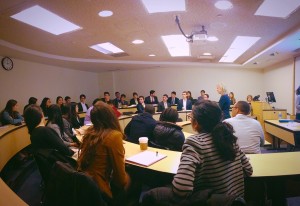 to students as it relates to their career. The study garnered more than 3,000 student respondents from two- and four-year colleges and universities across 44 states. Over 17,000+ open-ended responses were submitted citing personal stories about their motivation and the greatest influences on their career goals.
to students as it relates to their career. The study garnered more than 3,000 student respondents from two- and four-year colleges and universities across 44 states. Over 17,000+ open-ended responses were submitted citing personal stories about their motivation and the greatest influences on their career goals.
92 percent of the 3,000+ students who responded identified “personal fulfillment” as the top indicator of career success, far above financial rewards and public recognition. “Making a difference” trumped money, status, and power, showing that they want to see a real connection between their work and their values.
How can we challenge companies – both large and small and in every sector and industry – to build a culture and management team that reflects those values and appeals to what millennials want in order for the individuals and the organization to achieve success?
4word: How can a millennial benefit from having a mentor? How can a potential mentor most impact a millennial mentee?
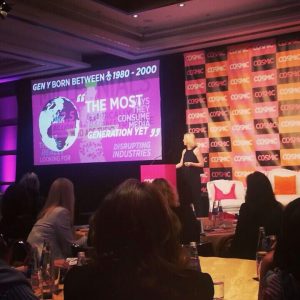 Joan: Connecting and building relationships that matter can make a huge difference in your confidence, AND building trusting relationships can help you discover or confirm the best career to match your unique talents. I owe a great deal of gratitude to the mentors in my life who have coached me through both personal and professional life changing decisions. Many of whom I met as a student at the University of Pittsburgh and were alumni, professors, and administrators.
Joan: Connecting and building relationships that matter can make a huge difference in your confidence, AND building trusting relationships can help you discover or confirm the best career to match your unique talents. I owe a great deal of gratitude to the mentors in my life who have coached me through both personal and professional life changing decisions. Many of whom I met as a student at the University of Pittsburgh and were alumni, professors, and administrators.
Relationships are critical to your career. Studies show that 60 – 80% of all job offers are the direct result of networking. The job market is tough, and who you know can make a difference in getting the job that you want.
You need both mentors and sponsors! There is a difference which I learned from my exposure to Sylvia Hewlett and Carolyn Buck-Luce of The Center for Talent Innovation, a global think tank. Mentors act as a sounding board and offer advice that could be professional and sometimes personal with support and guidance as requested; they expect very little in return. Sponsors, in contrast, are much more vested in their protégés, offering guidance and critical feedback, because they believe in them.
Sponsorship is earned and is specific to your career. You have to be a high performer, express interest in advancement, and prove that your brand is worth being associated with. Sponsorship relationships lead to money, recognition, advancement, and ambition.
These relationships are a TWO-WAY STREET so I focus my advice to students on my campus speaking tour around THEIR role as a mentee and as a protégé.
4word: Your company Why Millennials Matter aims to help companies understand and value the Gen-Y group of employees and consumers. What are some of the top “hurdles” companies must overcome when interacting with millennials?
Joan: Many companies are beginning to focus on millennials as consumers but forget about them as employees and future leaders. The INTERNAL customer will ultimately be your best brand ambassador. So include your youngest employees in strategic business discussions. It’s more powerful to create and develop internal ambassadors of your brand to help you crack the code on what your customers want. And try to involve your customers in early product development and strategy.
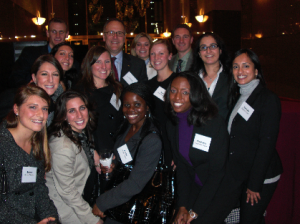 We can learn so much from our own team. In my first management role, I was responsible for hiring and making pay, promotion, and development decisions for 13 people, and it was a huge tipping point for me. I was 27 years old, and despite feeling overwhelmed with my own high expectations, I managed to learn early on how important it is to put your team’s interests before your own. Getting to know their personal motivators played a huge role in determining our best strategy that ultimately pulled us from #77 out of #77 to the #1 spot in the country. Their pride in becoming the leader for our division is a moment I will never forget. Their success as a team was more fulfilling and motivating to me than any individual recognition I ever received.
We can learn so much from our own team. In my first management role, I was responsible for hiring and making pay, promotion, and development decisions for 13 people, and it was a huge tipping point for me. I was 27 years old, and despite feeling overwhelmed with my own high expectations, I managed to learn early on how important it is to put your team’s interests before your own. Getting to know their personal motivators played a huge role in determining our best strategy that ultimately pulled us from #77 out of #77 to the #1 spot in the country. Their pride in becoming the leader for our division is a moment I will never forget. Their success as a team was more fulfilling and motivating to me than any individual recognition I ever received.
Generational dynamics in the workplace impact results. If we are going to bring our generations together in such a way that everyone feels that all contributions are valued, then we need to recognize both the similarities and the differences. There are absolute commonalities: 1) All generations want authenticity and respect. 2) All generations want the opportunity to contribute ideas and see the impact they are having on the company or community in which they are serving. But millennials have been the loudest and most vocal in expressing this, because they have had a larger global platform to do that via social media and the internet in general. The differences come down to the expectations of millennials who will demand that this be a priority for their employers in every sector. They see no other way on the path to innovation except being part of a organization that is inclusive, diverse, and one that puts its people first. It’s not just words on a plaque in the company lobby. For millennials, you must walk the walk, not just talk the talk. If your day-to-day operations do not match your recruiting message, they will have one eye on the door from the second they walk through it.
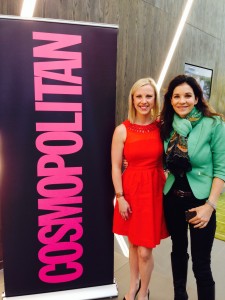 Engaging employees of all generations is important, but investing time with millennials through mentoring, training, and leadership development will unleash a new wave of innovation and creativity. The future of your business is dependent on how you approach this next generation of leaders.
Engaging employees of all generations is important, but investing time with millennials through mentoring, training, and leadership development will unleash a new wave of innovation and creativity. The future of your business is dependent on how you approach this next generation of leaders.
Connecting your internal talent insights with your top clients is an innovative approach to exchanging ideas around millennials as employees and consumers. Associated Media Publishers, a media company based in Cape Town, South Africa, hired me for a week long roadshow in partnership with Cosmopolitan Magazine’s South Africa edition. We partnered on a study of millennials across South Africa and compiled these insights with my own expertise to build a presentation that was shared exclusively with AMP’s clients. Some of the brands who attended a session with me included clients in the Beauty, Fashion, Auto, Finance and Retail segments such as Chanel, Burberry, Nivea, Revlon, Estee Lauder, KFC, Unilever, Proctor & Gamble, The Body Shop, Tom Ford, Guess, Topshop, Levis, Audi, BMW, Woolworths, and Samsung.
4word: You had the opportunity to be a part of the upcoming book Five Most Important Questions. How will this book impact millennials who hope to one day be leaders?
Joan: There is a ton of buzz about the youngest generation in the workplace and their struggles in the job market. The millennials who do find work in today’s leading companies are increasingly frustrated by the traditional career paths and limited developmental training opportunities. Talented young people are not waiting to be tapped to lead. Instead, they are starting businesses online in every industry and across the globe. Carl Schramm, president and CEO of the Kauffman Foundation, “Fifty-four percent of the nation’s millennials either want to start a business or already have started one.” CBS news reported that one in five millennials 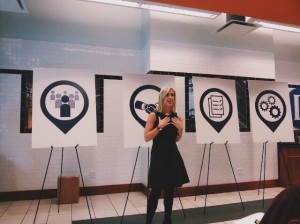 plan to quit their job and start a business, but they lack resources. Deloitte released a report on millennials citing two key points: Millennials Value an Open, Transparent, Inclusive Leadership Style & They Know They Are Not Ready for Leadership, But They Want it Anyway.
plan to quit their job and start a business, but they lack resources. Deloitte released a report on millennials citing two key points: Millennials Value an Open, Transparent, Inclusive Leadership Style & They Know They Are Not Ready for Leadership, But They Want it Anyway.
The shared mission of Why Millennials Matter and The Frances Hesselbein Leadership Institute is to develop and share resources with emerging leaders around the world. Peter Drucker’s wisdom is timeless and credible to today’s business and leadership needs. It’s also simple which is what young leaders crave and tenured executives need in today’s cluttered information-overloaded environment. I championed this book proposal and final development, because I believe we can create a common language amongst millennials and management to help them succeed as leaders and advance their organizations. We can inspire rising talent to better understand core business questions which will allow them to communicate and collaborate more effectively with tenured leadership.
I’m inspired daily by my network of millennials around the globe and hope to empower a whole new generation of Drucker and Hesselbein fans. My role is to help translate and connect Drucker’s wisdom and advice into the voice that is most applicable and relevant to young leaders.
This new edition of The 5 Most Important Questions: Enduring Wisdom for Today’s Leaders by Peter Drucker, Frances Hesselbein, and myself serves as a resource and conversational tool to support more effective business planning amongst multiple generations. Peter Drucker wrote 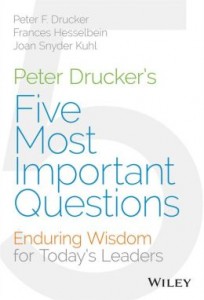 the first edition of this book as a tool for organizational assessment and to build a common language for strategic business discussions. It has been, and should be, used to get input, clarify the mission, establish targeted results, plan for the future, and identify what our customer values.
the first edition of this book as a tool for organizational assessment and to build a common language for strategic business discussions. It has been, and should be, used to get input, clarify the mission, establish targeted results, plan for the future, and identify what our customer values.
Peter Drucker was known as “the father of modern management” and an executive business guru. The framework of this simple book ignites discussion throughout an organization. Nonprofit leaders can use this for leaders of all ages. This new edition has a specific focus around young, millennial generation leaders to expose them to a broader framework, in areas where they may not have been educated, in order to see the full strategy within the organization.
In addition to contributions from Jim Collins, Marshall Goldsmith, and Judith Rodin, the book features new insights from some of today’s most influential leaders in business (GE and Salesforce.com), academia (Harvard Business School and Northwestern University), social enterprise (Levo League, Pencils of Promise and Why Millennials Matter) and the military (United States Military Academy) who have been directly influenced by Drucker’s theory of management. The five simple questions elicit profound responses which can generate dynamic discussions amongst team members. It remains a timeless resource that is tangible and easy to use for experienced leaders to bring together multi-generational teams, and also those that have diversity of roles in nonprofits (staff, board members, volunteers, etc.).
4word: What are three things a millennial should keep in mind when entering a new workplace? What are three things employers should keep in mind when employing and managing millennials?
Joan:
Advice to Millennials:
- Find Mentors & Earn Sponsors. YOU must be trustworthy. Lead with a “YES” attitude, as in you are ready to help your mentor or sponsor achieve their goals. You must be loyal and help them build a positive reputation for their brand. You have to be respectful of their time but own the proactive nature of scheduling time together – it may not always be in person, but through phone, email, however you can keep in touch. It’s on YOU, not them, to manage this relationship.
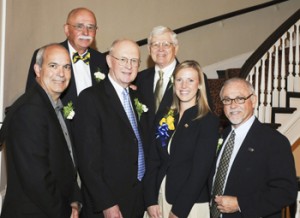 Work on your PERSONAL BRAND. Being clear on your brand is important. You can share your strengths and offer them to your mentor/sponsor in support of their goals. Maybe they are clueless about social media but also want to build their own thought leadership. Or they just need help using their technology devices more efficiently or need someone to help drive attendance to an event or need an innovative perspective on a new project they are pursuing.
Work on your PERSONAL BRAND. Being clear on your brand is important. You can share your strengths and offer them to your mentor/sponsor in support of their goals. Maybe they are clueless about social media but also want to build their own thought leadership. Or they just need help using their technology devices more efficiently or need someone to help drive attendance to an event or need an innovative perspective on a new project they are pursuing.- JOURNAL: I’m big into journals, and I have always kept CAREER JOURNALs. This is much different than “Dear Diary” so I encourage women of all ages– if you don’t have one, buy a blank one today – – write down thoughts, reflections, recaps of career convos with mentors or influencers, favorite quotes, etc. I spent a lot of time in college and afterward in BN bookstores journaling with a cup of coffee, just trying to get all the thoughts running out of my head and on to paper so I could figure out what to do next. It’s not a coincidence that I work with Barnes & Noble College today. They were truly a sanctuary for me throughout my life where I could go to reflect, unplug, and recharge toward my dreams and goals.
Advice to Employers:
- Increase your management team’s awareness about the values and motivators across generations. Teach them to focus on people as individuals in order to inspire productivity, innovation, and results.
- Share your MISSION and make sure its reflected in all you do.
- Invest your training and development budget in your younger workforce. The future of your business is dependent on how you approach this next generation of leaders. Managers of millennials will need to best diagnose where young talent will need targeted training and development. Focus on building those skills immediately and outline a plan for their development that involves coaching and feedback from you or other internal/external mentors and coaches. If your organization does not have the resources to develop or have an in-house training program around professional skills, there are plenty of options that are based in self-paced study and experiential learning practices.
——
If you’re a millennial, we hope that Joan’s advice for you will help you succeed in the workplace with your current and future employers. If you’re an employer of millennials, consider Joan’s words of wisdom regarding millennials and see what new practices and ideas you can incorporate into your office that will help your team run smoothly.
Want to win a copy of “Five Most Important Questions,” signed by Frances Hesselbein? Click here to enter! One winner will be chosen on March 28, 2015!
If you’re a millennial, what struggles have you dealt with in your career so far? If you’re an employer or co-worker of a millennial, what differences or obstacles have you encountered?
——
While pursuing a career in the fields of business and healthcare, Joan has used her background of leadership in both the private and social sectors. Joan has over 13 years of corporate management experience working at Eli Lilly, Forest Laboratories and Actavis in the roles of sales, marketing, organizational effectiveness, training and development. She has been recognized for her turnaround tactics leading teams to high performance results and developing corporate wide training initiatives for two global healthcare organizations.
After a decade of mentoring and coaching thousands of Millennials (aged 18-34 years old) from around the world to help them achieve their potential, Joan Snyder Kuhl launched Why Millennials Matter. Why Millennials Matter is a Gen-Y speaking and consulting company based in New York City that focuses on raising awareness to employers about the value of investing in their future workforce and the millennial customer segment. Organizations are struggling to attract and retain Millennials (Generation Y) because they lack the insights into what this generation wants out of their employer and the benefits that will inspire their loyalty. The same struggle exists for organizations and global brands that are trying to connect with Millennials as consumers through marketing and product development. Joan bridges the gap in understanding Millennials with practical strategies for connecting with them and garnering their loyalty.
